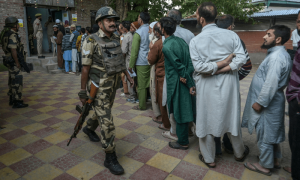THE sanctioning of $1bn in military aid to Pakistan by the US Congress will be hailed in many quarters in Pakistan as a sign of improving relations between Pakistan and the US and evidence of trust in the leadership and strategy of army chief Gen Raheel Sharif.
But a few will want to ask a more basic question: why does Pakistan still need US funds to fight militancy inside Pakistan?
The billion-dollar military funds that Pakistan will receive in the year ahead is a decade-old programme, beginning in a period when the country first began to militarily confront the militant threat and when the military was neither fully prepared nor properly resourced to fight militants.
Also read: Congress approves defence bill, CSF for Pakistan
But a decade is a long time and during it the Pakistani military has developed indigenous strategies to fight militants, so why is the state still so reliant on outside funding for military operations here?
Consider that $1bn is roughly Rs100bn, a significant chunk of not just the overall military budget each year but an overwhelming proportion of the extra funds that are allocated for specific military operations.
So were the aid to be suddenly withdrawn or were Pakistan to surprisingly reject it, it would have wrenching budgetary consequences in the short and even medium term. But aid alone should not be the consideration here. Consider that in the fight against militancy narrative matters, especially the narrative being propagated by the militants to recruit and motivate its fighters.
The annual cash doled out to Pakistan by the US makes for a straightforward and alarming narrative for militants to spread: that Pakistan is still doing all that it does in terms of military operations and counterterrorism measures because it is being paid to do so by the US.
While simply untrue – not only is the fight against militancy a Pakistani fight too, it is being fought here because the state understands its necessity for the security and stability of Pakistan – the militant narrative will always gain some traction, if only because military aid continues to flow into Pakistan from the US.
It is one thing to receive equipment and resources considered necessary by the Pakistani state for its military; it is quite another to be paid for military operations that are vital to our own survival.
In other countries, where trade-offs also have to be made, the rise of the militant threat would have not left operations starved of funds.
Instead, hard decisions would have been made domestically to free up the necessary funds.
The military would be required to forego non-essential expenditure, long-term spending and acquisition plans would be tweaked and the state would work hard to either free up more budgetary resources for the operations or find equitable ways to increase revenue to pay for them. In Pakistan, it seems turning to good old Uncle Sam is enough.
Published in Dawn, December 15th, 2014











































